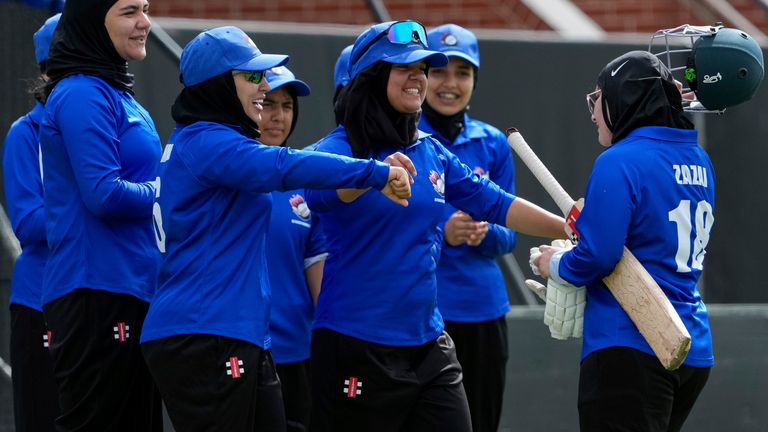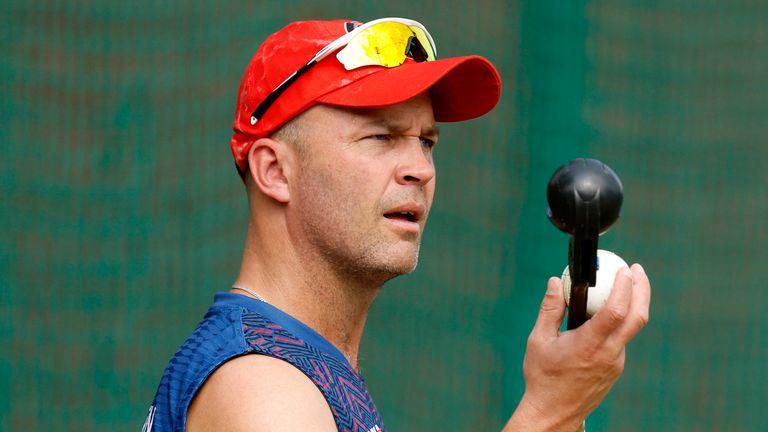England play Afghanistan in a crucial ICC Champions Trophy match for both sides on Wednesday – but there were calls from politicians for Jos Buttler’s side to boycott the fixture in response to Taliban rule in the country.
The Afghanistan women’s cricket team fled the country in 2021 after the Taliban regained power and most of them sought refuge in Australia. But for over three years they say they’ve been ignored and sidelined by the International Cricket Council (ICC) despite making multiple pleas for help.
The men’s team have still been allowed to compete during this time, despite the country not having a women’s team – something that is not allowed under ICC law – and have seemingly received no punishment.
In January, Afghanistan’s exiled women’s cricketers represented their country for the first time since the Taliban reclaimed control, featuring in an historic exhibition match against Cricket Without Borders (CWOB), in what they hope will mark the start of a new journey for them.
‘It’s time for ICC to take action’, says Afghanistan women’s cricketer
Afghanistan women’s cricketer, Firooza Amiri, says that an England boycott of the men’s Champions Trophy match against Afghanistan was not the answer.
Speaking to Sky Sports News, she said: “It’s good to see that the world wants to support us and support Afghan women, but I personally think a boycott doesn’t have any impact.”
Firooza added on the future of the Afghanistan team: “It’s time for ICC to take action and recognise us as a national team, and let us compete on the world stage, or recognise us as a refugee team, then we can represent Afghanistan.”
Sky Sports News understands that before the Taliban’s 2021 takeover, the Afghanistan Cricket Board [ACB] committed to improving and building a women’s programme, with 25 players selected.
This progress stopped in mid-2021 and the ICC formed the Afghanistan Working Group, to examine a whole host of issues that arose with the change of government in Afghanistan including government interference, funding, constitutional issues and women’s cricket.
However, the entire board was all-male and following a meeting in 2023, the cricket chiefs significantly raised the men’s team’s budget whilst providing no update on the women’s team.
“The Afghan women players who are in exile are not part of this. They have not been communicated to, to the best of my knowledge, and they need to have a seat at the table,” Shubham Jain told Sky Sports News, a fellow at the Centre for Sport & Human Rights and University of Cambridge doctoral researcher.
“They need to have their voices heard, to tell this working group what they can do to change their lives, to make sure that what they do is for their benefits.”
Sky Sports News understands that the ICC have communicated with the exiled Afghanistan players. However, there is no direct relationship, as this sits with the ACB.
Afghanistan men’s players know things ‘not correct’ in home country
Afghanistan men’s head coach Jonathan Trott says his players know “there are things that are not correct” in the country amid the assault on women’s rights under the Taliban regime.
Ahead of the crucial Champions Trophy clash against England in Lahore on Wednesday, former England top-order batter Trott suggested his side are playing for the Afghanistan people and not the regime.
“They [the players] know the difference between right and wrong,” he told the BBC. “It is a real tricky situation for them. I try to be as compassionate about everything they are going through.
“We work very hard in bringing joy to the country and the guys are very passionate and brave and very proud of being able to do that – but knowing full well that there are things that are not correct.
“They know who they are playing for and representing. I can’t speak for individuals but can speak for my intentions and passions for the game of cricket and trying to leave the game in a better place.”
South African-born and raised Trott added: “I can see the world’s concern, I am concerned… I have daughters who play cricket and I am fully proud and encourage that.
“I am proud of where I come from and the change the country made for the betterment of everybody. Hopefully one day I can see that in Afghanistan.”
Afghanistan men’s captain Hashmatullah Shahidi said in his pre-match press conference: “Everyone wants to see the Afghani women play.”
And when asked whether England boycotting Wednesday’s clash would have been beneficial, he added: “We are cricket players and sportsmen.
“We can only control what happens inside the cricket ground, not outside. Everyone would like to see everyone [men and women] play. When it comes to politics we can’t control that. We can only control cricket.”
Boycott of men’s fixture would be ‘counter-productive’, says ECB chief
A group of more than 160 politicians, including Nigel Farage, Jeremy Corbyn, and Lord Kinnock, signed a letter encouraging England to boycott their Champions Trophy match against Afghanistan.
Meanwhile, UK Prime Minister Sir Keir Starmer called for the ICC to “deliver their own rules”, with the Culture Secretary Lisa Nandy saying the match “should go ahead” as not to penalise the England team, but suggested that British dignitaries should snub the event.
Despite the calls for a boycott, the England and Wales Cricket Board confirmed last month they would fulfil the fixture, with chief executive Richard Gould telling Sky Sports News: “I think that [a boycott] would be counter-productive.
“I think if you end up boycotting a game, the Taliban won’t care. Half the Taliban don’t want cricket at all being played in Afghanistan, so that doesn’t help the Afghani people, and that’s where our priorities are.
“This has been a difficult decision, because when we see the gender apartheid that’s taking place in Afghanistan under the Taliban organisation, it’s disgusting.
“It’s not something that we want to be associated with, or anybody does, in terms of taking the sport forward.
“We need to make sure that the ICC takes action, because we need to make sure that as a sport, as a global sport, that we are sending the appropriate messages.”
Jain said: “There is a lot of things that other cricketing nations are doing, and they can do more. One is the idea around funding they can provide to the cricket players in exile.
“The ECB, for instance, recently donated [£100,000 to the Global Refugee Cricket Fund], which is a great initiative. More and more boards should do that.
“Cricket Australia is helping the players with being hosted in Australia. And there’s a [CWOB] match that happened recently, which they had a huge part in.
More and more support like that would be welcome. And also, I think demanding the ICC to take care of the matter, to demand the other sports bodies and other stakeholders to make sure that some progress can be made.
“The ECB has sent a letter to ICC recently, we have heard that Cricket South Africa and Cricket Australia have also been writing, so if more and more boards do these things that can go a long way.”
Banned, ignored, exiled – women’s cricket in Afghanistan
Since the Taliban regained control of Afghanistan in August 2021, women’s rights have rapidly deteriorated in the country, with new laws seeing them banned from universities, parks, sports, and – more frighteningly – preventing them from speaking in public, or being heard singing or reading aloud, even from inside their own homes.
“There is a complete erasure of women [In Afghanistan] because they are banned from participating in any aspect of public life,” Jain said.
“To come out on the streets to play, to participate in any other cultural activity, or just to show their face or to even voice their opinions, everything is completely off the table in Afghanistan currently.
“It’s an issue that is much wider than sport. But sport is one vehicle where we can highlight these issues, which is why this becomes important.”
Under Taliban rule, payments to the women’s side were cut off and they received no contact from cricket’s governing body or the ACB.
In November 2021, former ICC chair Greg Barclay said the board was “committed” to supporting Afghanistan “to develop both men’s and women’s cricket”.
In July last year, the Afghanistan women’s team wrote a letter to Barclay to help them form a refugee team based in Australia but, despite their impassioned plea, the team did not hear back.
There also remains an inherent sense of injustice, with the men’s team still being allowed to compete despite a clear violation of the ICC rules, which states having a national women’s team is one of the main requirements for becoming a full member.
However, with the support from CWOB and Cricket Australia, and continued calls for action from the ICC, the Afghanistan women’s cricketers remain hopeful they will be able to grace the stage once again.
“This issue needs to be front and centre all the time,” Jain said. “We need to keep talking about it every opportunity we get, give the space to talk about this issue, give the space to the women of Afghanistan.
“You know what is the antidote to erasure? The antidote to erasure is visibility.”









